It seemed that just as tillage farmers were getting their true feelings out it was time for the Irish Tillage and Land Use Society’s winter conference to draw to a close.
It was an informative and interesting day, from Ireland’s grain sector being described as one big feed mill, to encouragement to contribute to new pesticide legislation, to differing views on nitrates.
The tillage sector faces huge challenges in 2023. CAP payments are set to fall and inputs remain at high levels, while grain markets have dropped significantly from the highs of last summer.
It was clear that there was an appetite for information among the 110-strong crowd, mixed between farmers and industry.
There was clearly also a call for more tillage supports. Specific tillage schemes were suggested and more options under TAMS. In relation to nitrates, it was said that future policy needs to focus on fertiliser use efficiency and a reduced reliance on artificial fertiliser. Grant-aided slurry storage and accelerated capital allowances for tillage were suggested.
While the audience called for extra supports, one thing that Bill Callanan, chief inspector at the Department of Agriculture, made clear was that the Department is supportive of the industry and sees tillage as a critical part of the agricultural sector.
He said that tillage and crops will be even more critical in the longer term, as agriculture aims to cut its emissions, while he added that things will have to continue to improve in the sector.
He’s right; the tillage sector cannot stand still.
While challenges lie ahead, farmers must continue to become more sustainable to improve the economic and environmental performances of their businesses and while tillage has great credentials from an environmental stand point, we must continue to improve those credentials.
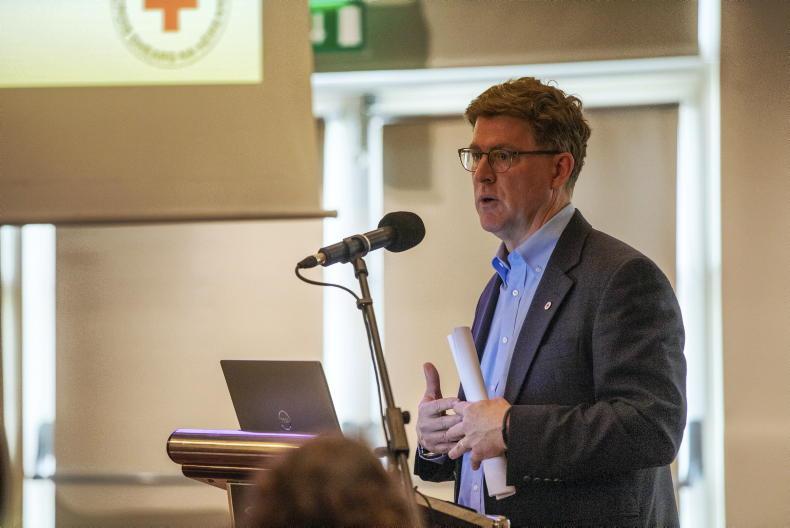
Charlie Lamson, head of fundraising at the Irish Red Cross, speaking at the ITLUS winter conference. \ Claire Nash
We must also fight to have more of those credentials verified.
The sector needs proper lifecycle assessments on grains.
Farmers are clearly frustrated by the different rules in different countries. ITLUS president Clive Carter made the comment that imports are entering the country produced under a whole other set of rules to Ireland, using pesticides and GM technologies, which Irish farmers cannot use.
One participant said that it is good to import grain into this country. Remember, if we are exporting, we have a surplus and we are going to take a lower price.It is also important to remember that Ireland exports about €14bn worth of agricultural and food products so we cannot forget that. The boats go both ways.
There was plenty of talk on Irish grain and the proposition to feed Irish rations. Bill Callanan noted that the funding increase for the Protein Aid Scheme from €3.5m to €7m under the new CAP, which starts in 2023 is there to try and increase the levels of native protein being grown in this country, which could eventually contribute to an Irish ration.
Nitrates
Staying on the topic of Irish grain and Irish rations, Teagasc tillage adviser Ciarán Hickey said that while Irish farmers adhere to many rules and produce products to high environmental standards, they should be rewarded for this.
Nitrates was one thing that came up frequently in a discussion on policy, and while there is an acknowledgement that all farmers need to do their bit, there was also clear frustration in relation to the new rules imposed on tillage farmers.

Some of the crowd at the ITLUS winter conference in the Clanard Court Hotel, Athy, Co Kildare. \ Claire Nash
Ciarán noted that a free-range egg producer is paid a higher amount than a conventional producer and this should also happen in tillage.
He struggled to explain to farmers this summer why they had to cultivate stubbles 14 days after harvest on some of the hottest days of the year.
He added that problems need to be tackled, but maybe the regulations need to be more location- or sector-specific.
All the while, these farmers are not being paid more. In some cases, the farmer is losing out on yield and therefore income as a result.
Ciarán commented that if a farmer has to cut pesticides and yield is reduced as a result, then they should be rewarded for that. He continued on to say that the Quality Assurance scheme needs to be “beefed up”.
Have your say in the sustainable use of pesticides regulations
The Department’s chief inspector encouraged those present to take part in the consultation, which his Department is currently running on the new Sustainable Use of Pesticides Regulations (SUR).
Ambitious targets have been set by the EU to reduce pesticide use by 50% by 2030 under the Farm to Fork strategy. Bill said that Ireland has made progress and has already cut pesticide use by 25%.
He explained that those cuts are based on usage figures on a three-year rolling average from 2015 to 2018.
However, further rules are set to come in around advice, use, application and recordkeeping.
The Department official said that it is early in the process of setting rules for the new pesticide regulations and farmers and the industry should get their views, thoughts and ideas into the Department early, so that they can contribute to that legislation.
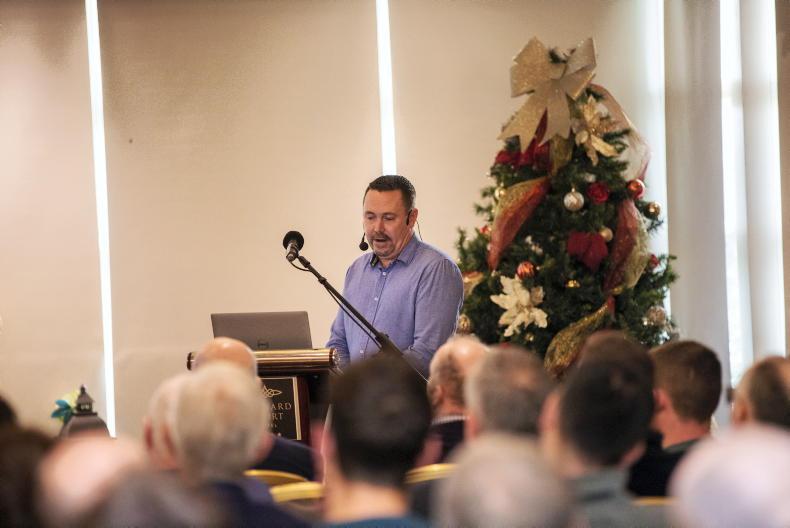
Farmer Gareth Culligan from Co Louth speaking at the ITLUS winter conference. \ Claire Nash
He added that the Department has opened the consultation to capture that information. “I’d urge people to engage with it, so that we can then bring the issues to the table that are relevant to Ireland.
Submissions must be made by 20 January 2023 and can be emailed to surconsultation@agriculture.gov.ie. More details can be found on the Government’s website.
Bill Callanan added that new breeding techniques may help to further reduce pesticide use and that decision support systems also need to be used.
Looking at GM, he said that Europe produced 297.5m tonnes of cereals in 2021. Ireland produced approximately 1% of those crops and that it is important to have a niche product.
However, the Department chief did add that gene-editing was different and may offer opportunities in the sector in time.
Bill Callanan noted that his department has responsibility for farm safety. He urged all in attendance to stay safe on the farm and to take care in their daily jobs. He added that, collectively, we need to work harder at farm safety.
“Let’s be safe folks, final message,” he concluded.
It seemed that just as tillage farmers were getting their true feelings out it was time for the Irish Tillage and Land Use Society’s winter conference to draw to a close.
It was an informative and interesting day, from Ireland’s grain sector being described as one big feed mill, to encouragement to contribute to new pesticide legislation, to differing views on nitrates.
The tillage sector faces huge challenges in 2023. CAP payments are set to fall and inputs remain at high levels, while grain markets have dropped significantly from the highs of last summer.
It was clear that there was an appetite for information among the 110-strong crowd, mixed between farmers and industry.
There was clearly also a call for more tillage supports. Specific tillage schemes were suggested and more options under TAMS. In relation to nitrates, it was said that future policy needs to focus on fertiliser use efficiency and a reduced reliance on artificial fertiliser. Grant-aided slurry storage and accelerated capital allowances for tillage were suggested.
While the audience called for extra supports, one thing that Bill Callanan, chief inspector at the Department of Agriculture, made clear was that the Department is supportive of the industry and sees tillage as a critical part of the agricultural sector.
He said that tillage and crops will be even more critical in the longer term, as agriculture aims to cut its emissions, while he added that things will have to continue to improve in the sector.
He’s right; the tillage sector cannot stand still.
While challenges lie ahead, farmers must continue to become more sustainable to improve the economic and environmental performances of their businesses and while tillage has great credentials from an environmental stand point, we must continue to improve those credentials.

Charlie Lamson, head of fundraising at the Irish Red Cross, speaking at the ITLUS winter conference. \ Claire Nash
We must also fight to have more of those credentials verified.
The sector needs proper lifecycle assessments on grains.
Farmers are clearly frustrated by the different rules in different countries. ITLUS president Clive Carter made the comment that imports are entering the country produced under a whole other set of rules to Ireland, using pesticides and GM technologies, which Irish farmers cannot use.
One participant said that it is good to import grain into this country. Remember, if we are exporting, we have a surplus and we are going to take a lower price.It is also important to remember that Ireland exports about €14bn worth of agricultural and food products so we cannot forget that. The boats go both ways.
There was plenty of talk on Irish grain and the proposition to feed Irish rations. Bill Callanan noted that the funding increase for the Protein Aid Scheme from €3.5m to €7m under the new CAP, which starts in 2023 is there to try and increase the levels of native protein being grown in this country, which could eventually contribute to an Irish ration.
Nitrates
Staying on the topic of Irish grain and Irish rations, Teagasc tillage adviser Ciarán Hickey said that while Irish farmers adhere to many rules and produce products to high environmental standards, they should be rewarded for this.
Nitrates was one thing that came up frequently in a discussion on policy, and while there is an acknowledgement that all farmers need to do their bit, there was also clear frustration in relation to the new rules imposed on tillage farmers.

Some of the crowd at the ITLUS winter conference in the Clanard Court Hotel, Athy, Co Kildare. \ Claire Nash
Ciarán noted that a free-range egg producer is paid a higher amount than a conventional producer and this should also happen in tillage.
He struggled to explain to farmers this summer why they had to cultivate stubbles 14 days after harvest on some of the hottest days of the year.
He added that problems need to be tackled, but maybe the regulations need to be more location- or sector-specific.
All the while, these farmers are not being paid more. In some cases, the farmer is losing out on yield and therefore income as a result.
Ciarán commented that if a farmer has to cut pesticides and yield is reduced as a result, then they should be rewarded for that. He continued on to say that the Quality Assurance scheme needs to be “beefed up”.
Have your say in the sustainable use of pesticides regulations
The Department’s chief inspector encouraged those present to take part in the consultation, which his Department is currently running on the new Sustainable Use of Pesticides Regulations (SUR).
Ambitious targets have been set by the EU to reduce pesticide use by 50% by 2030 under the Farm to Fork strategy. Bill said that Ireland has made progress and has already cut pesticide use by 25%.
He explained that those cuts are based on usage figures on a three-year rolling average from 2015 to 2018.
However, further rules are set to come in around advice, use, application and recordkeeping.
The Department official said that it is early in the process of setting rules for the new pesticide regulations and farmers and the industry should get their views, thoughts and ideas into the Department early, so that they can contribute to that legislation.

Farmer Gareth Culligan from Co Louth speaking at the ITLUS winter conference. \ Claire Nash
He added that the Department has opened the consultation to capture that information. “I’d urge people to engage with it, so that we can then bring the issues to the table that are relevant to Ireland.
Submissions must be made by 20 January 2023 and can be emailed to surconsultation@agriculture.gov.ie. More details can be found on the Government’s website.
Bill Callanan added that new breeding techniques may help to further reduce pesticide use and that decision support systems also need to be used.
Looking at GM, he said that Europe produced 297.5m tonnes of cereals in 2021. Ireland produced approximately 1% of those crops and that it is important to have a niche product.
However, the Department chief did add that gene-editing was different and may offer opportunities in the sector in time.
Bill Callanan noted that his department has responsibility for farm safety. He urged all in attendance to stay safe on the farm and to take care in their daily jobs. He added that, collectively, we need to work harder at farm safety.
“Let’s be safe folks, final message,” he concluded.







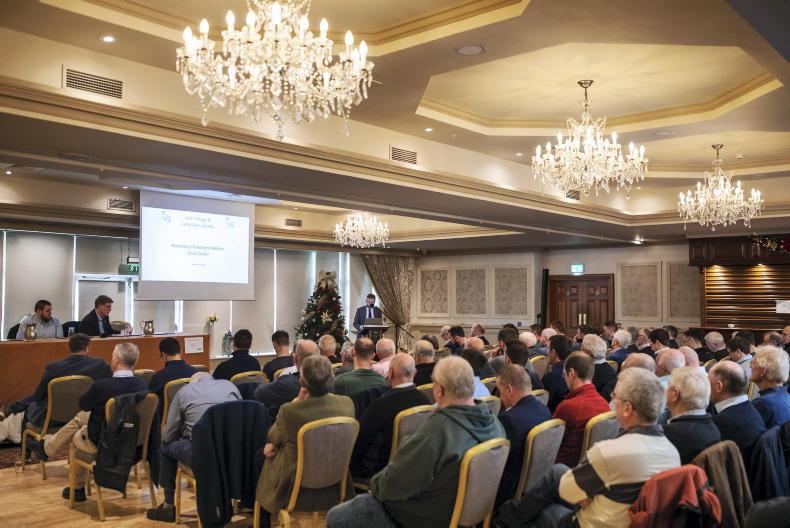
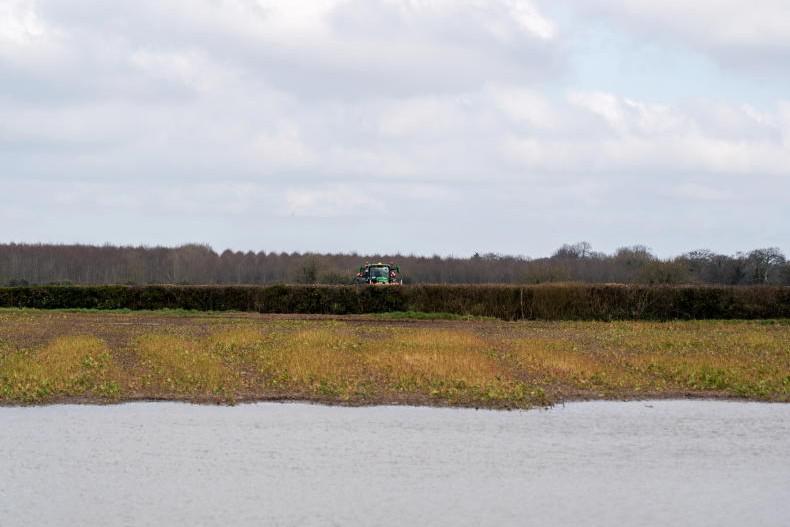

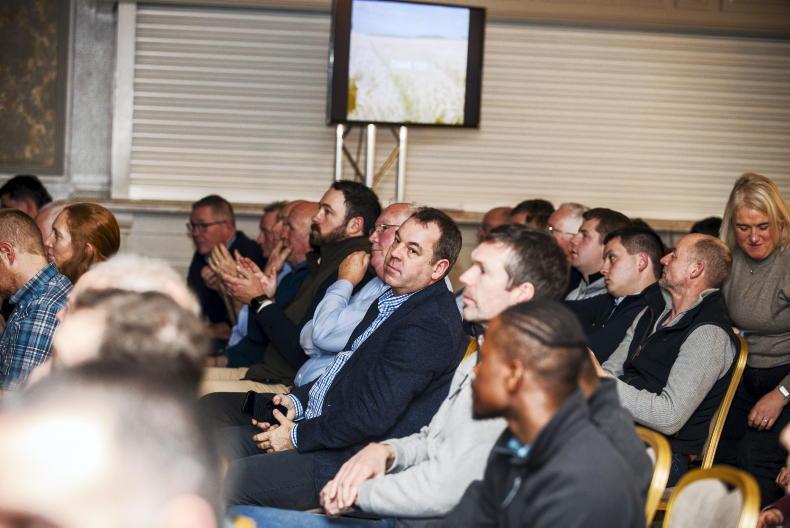
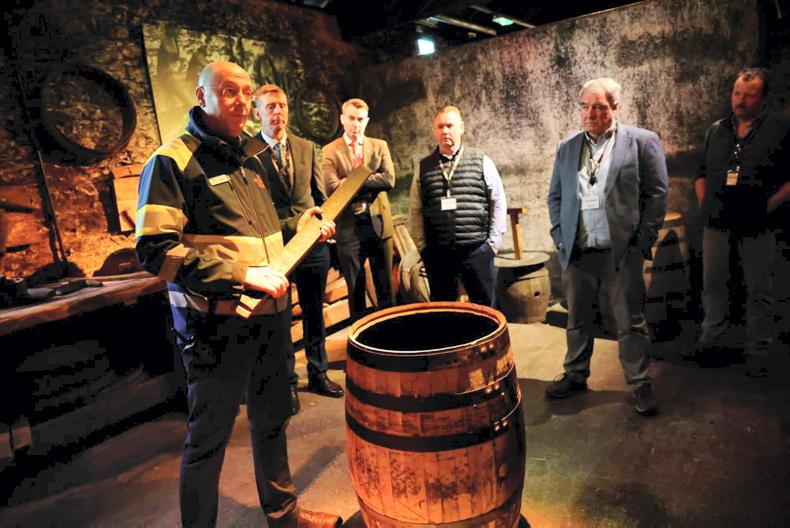
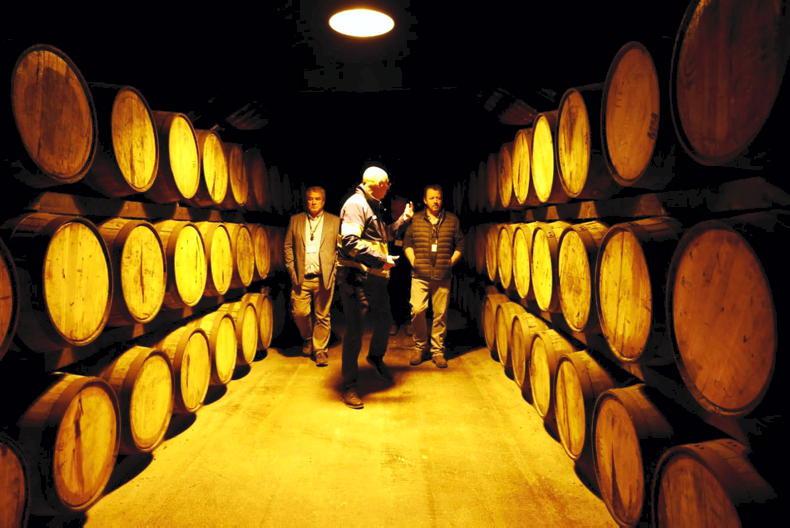
SHARING OPTIONS